GCSE results same in Wales for third year running
- Published
At Ysgol Friars in Bangor, Gwynedd, head Neil Foden said it is down to hard work over two years
The GCSE A* to C pass rate has stayed at 66.6% in Wales for the third year running.
But Welsh results are now the same as England as a whole and better than most of its regions.
Top A* and A passes were up slightly (0.2%) to 19.4% and better than northern and midland English regions.
Education Secretary Kirsty Williams said it was "another strong performance".
Education Secretary Kirsty Williams says changes to the exam system will take time to bed in to bring more improvements
Teaching unions have warned comparing Welsh and English results is increasingly difficult due to significant changes to exams.
There are wide-ranging reforms to qualifications in Wales and other parts of the UK under way.
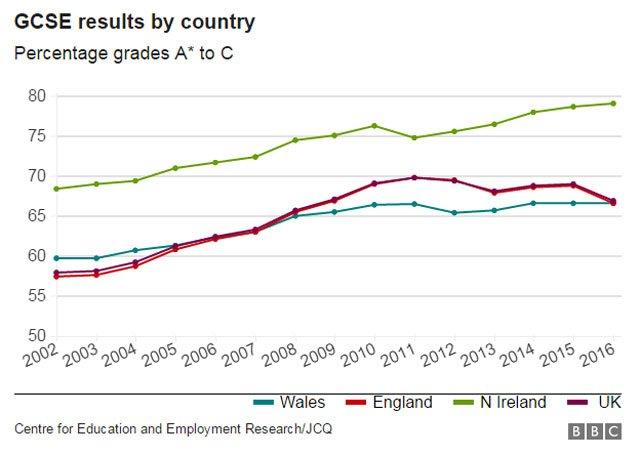
The overall A* to C rate remains in line with the 2014 figure, while in England it fell 2.2% to 66.6% - the same as in Wales.
There was a slight increase in the percentage of the very top A* grades, up 0.1% to 6.1%.
The gender gap has widened slightly - a difference of 9.2% in performance between girls and boys, following a broadly similar pattern to England again.
Maths is difficult to compare because so many pupils took their exams last November. Exam board WJEC said if you look at the whole academic year instead, 65.5% of 16 year olds got A*-C grades compared with 63.7% for 2014/15.
There were improved results in history and French.
Although English results were down 1.9%, the WJEC said the results were stable when looking at the results for 16-year-olds over the whole year.
GCSE science A* to C passes were down this year from 57.5% to 50.6%, while performance in the individual science subjects were more stable with biology up, and chemistry and physics down.
Welsh language A* to C passes were down slightly to 73.5% compared with 73.9% last year.
More than 14,000 students were awarded a Welsh Baccalaureate diploma.
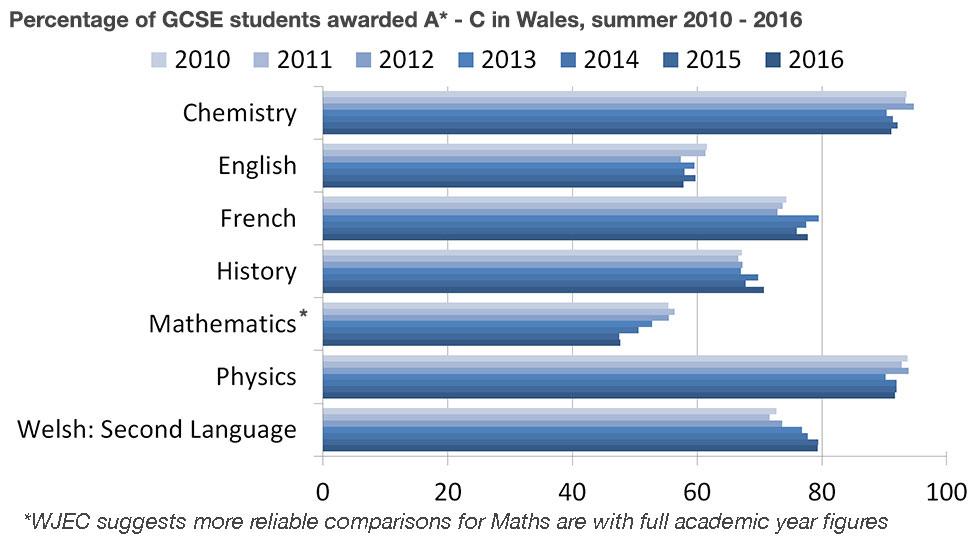
Entries in French were down again this year while the number taking maths in the summer was affected by the start of a new course last September, with the first pupils due to take exams in November.
Ms Williams, on a visit to Cefn Hengoed school in Swansea, said: "Teachers and pupils can be proud that Wales has maintained our record pass rate. I will continue to focus on raising standards and ambitions for excellence across all our schools."
David Reynolds, professor of education at Swansea University, said results have varied only slightly over the past few years.
"There have been similar results and you could say the system is maxed out if you like," he said.
"But that's not true. If you look at the range of variations in schools, there are huge differences still between the top and bottom performing schools, suggesting there is still room for improvement."
The way Wales and England will grade GCSEs will change from 2017. A guide to this and other reforms
New Welsh-specific GCSEs started being taught in schools and colleges last September but they will not be awarded until next summer.
More new qualifications will be rolled out over the next two years.
At the same time there are major changes being introduced in England, and next summer GCSEs there will be graded 9 to 1 rather than A* to G.

Abu Latif celebrating 11 A* grades and Adan Khan who has five A*s and four As at Ffynone House School in Swansea

More happy faces at Abergavenny’s King Henry VIII Comprehensive School
Teachers said care needed to be taken when looking at the drop in science results with around 4,000 15-year-olds and under - who would have done BTEC qualifications in the past - now included.
National Association of Head Teachers policy director in Wales Rob Williams said the results came with the biggest policy changes in education in a generation already under way.
"It's really difficult to compare," he said. "You have very diverging policies between England and Wales and there are changes in GCSE in both the countries and there are more coming in.
"Reflecting over the years is going to be much, much harder. For us in Wales it's going to be more important looking at the next three, four or five years and look back at how we're improving ourselves."
The NUT's Owen Hathway said: "That we have seen the record high pass rate sustained yet again, especially against the backdrop of major education reforms, is a fantastic achievement. It is also pleasing to see the pass rate for the very top grades is up".
Pupils at Ysgol Y Preseli react to their GCSE results
Qualifications Wales chief executive Philip Blaker added: "The overall GCSE results for Wales this summer are stable, with some small shifts which can be considered normal variation.
"In some subjects, performance has improved, such as French, geography and history whereas, in others it has fallen, for example ICT, religious studies and Spanish.
"This is to be expected since cohorts vary from one year to the next, in both size and ability."
Rebecca Williams, from teaching union Ucac, said: "Comparisons, both with previous years within Wales, and with other nations in the UK, are going to become increasingly difficult - indeed futile, as the changes work their way through the system."
She said the Pisa international test results - due again by the end of this year - could become an increasingly important benchmark.
"It's possible that - for better or for worse - external measures such as Pisa will take on greater importance in measuring educational performance in a comparative context," she added.
The Conservatives said they were worried about a stagnation in A* to C passes, with the results offering "a mishmash of reasons to be both optimistic and downbeat".
- Published25 August 2016

- Published25 August 2016

- Published25 August 2016
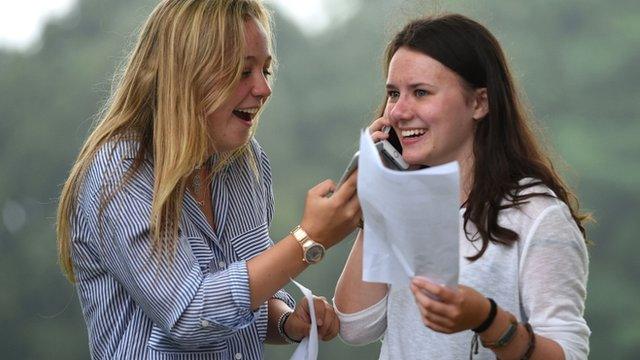
- Published20 August 2015
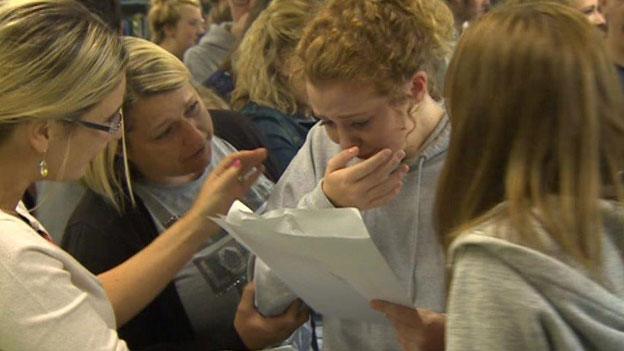
- Published3 November 2014
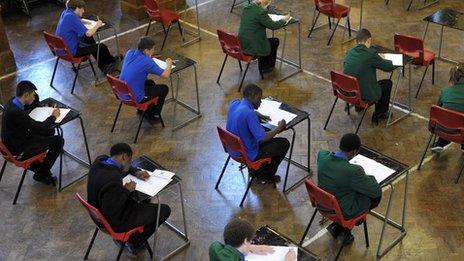
- Published18 August 2016
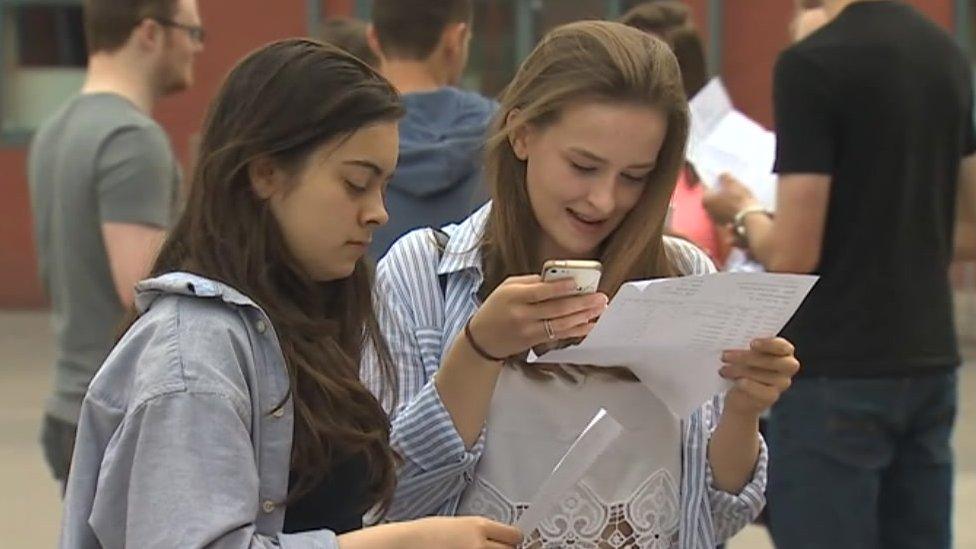
- Published18 August 2016
